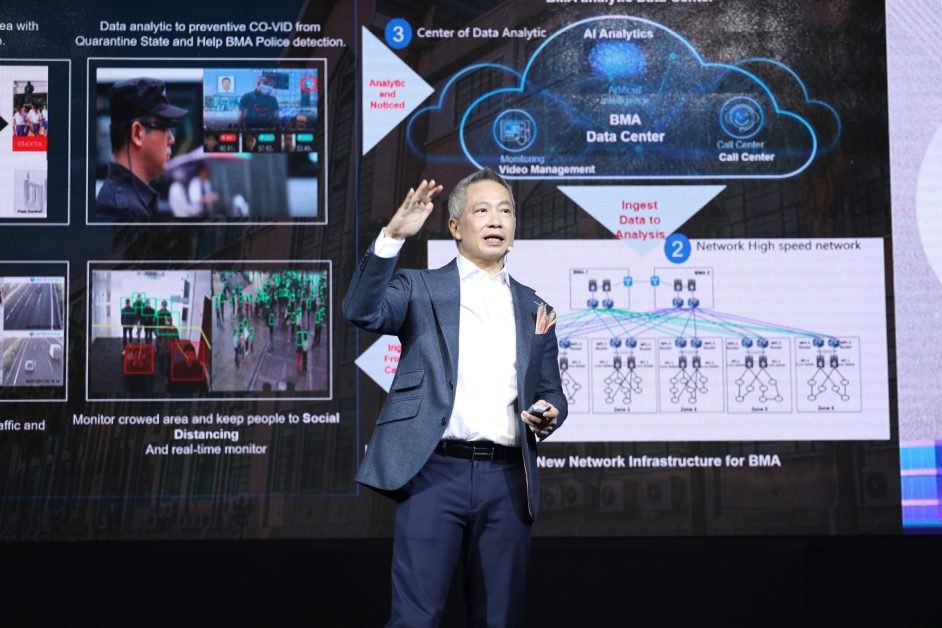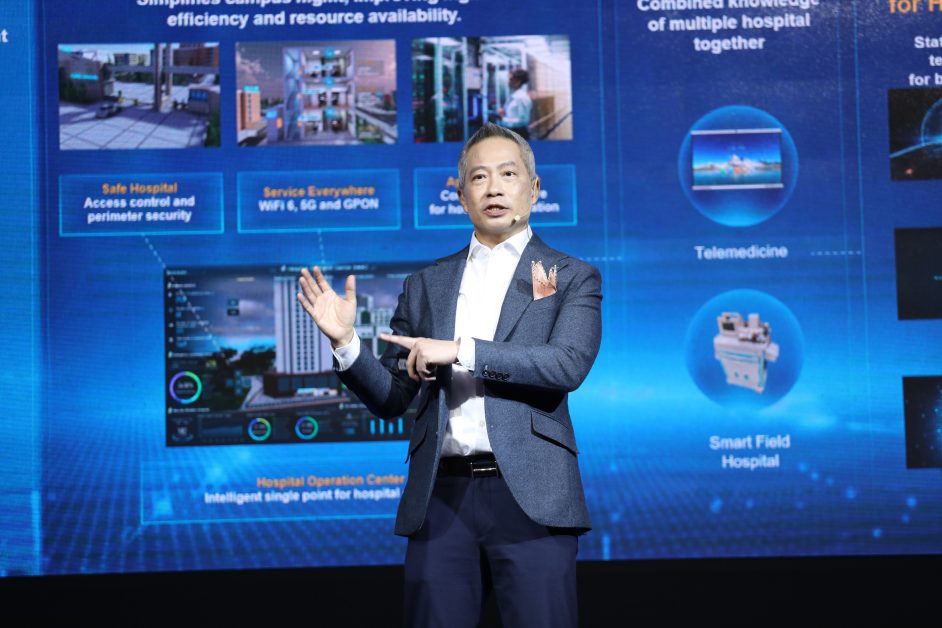A rapidly changing world and numerous challenges predicted to arise over the next decade, such as climate change and a shifting political and environmental landscape, are affecting the economic growth and livelihoods of people in every country. In a 2021 report from the World Bank, it was stated that ‘innovation’ is a key enabler to shape economic systems and promote the development of middle-income countries in East Asia. To this end, innovation and technology can be considered a ‘National Agenda’ and both have now become a top priority for Thailand.
The ‘Future of Thailand, Innovation as a Major Driving Force’ seminar is one of several strategic collaborations between the government, the private sector, and journalists, to determine a strategic approach towards the development of innovation and technology in Thailand. Dr. Chawapol Jariyawiroj, President of Huawei Technologies (Thailand) Co., Ltd., the leading global provider of technological infrastructure and ICT innovation, highlighted the importance of ‘Digital Technologies’ at the event: “Currently, we must acknowledge that digital technologies are significantly ‘disrupting’ the business, industrial, and public sectors in ways never before seen. Digital technologies will soon become the driving force in bringing in increased competitiveness and new business opportunities, as well as influencing every sector in the ecosystem. For the business sector, digital technologies will help lower production costs, accelerate services’ time-to-market, and enable market expansion, giving consumers convenient and quick access to products and services. For the public sector, digital technologies will create new experiences to enhance quality of life, promote stability across socio-economic landscapes, and positively stimulate people’s happiness.”
Dr. Chawapol also made mention of ‘Digital Twin’, one of the latest technology trends that many are predicting will be connected to all technologies, including intelligent digital technologies, within the next 7 to 10 years, and which consists of 3 main layers:
- Device Technology – To create ‘Digital Twin’ in a smart city, intelligent devices must always be able to send and receive data between devices and users. The data must be collected in a centralized data center and communicated between users and network service providers to drive integrated ecosystem growth and development.
- Connectivity Technology – Achieving high-speed data transmissions with ultra-low latency, such as 5G technology.
- Intelligence Technology – A wide range of intelligent technologies are currently available, such as AI, IoT, and Cloud. These innovations provide opportunities for the industrial sector and experts to develop smart cities and countries in several aspects.
Dr. Chawapol also referred to a comprehensive application of communication devices and ‘Digital Twin’ through CCTV in smart cities: “With smart cameras, we will be able to monitor activities in neighborhoods, optimize traffic, and promote sidewalk and parking management that will help create safe and more livable cities. In addition, future innovation and technology will be more eco-friendly, leading to green business operations and sustainable development. Furthermore, innovations will help accelerate public health transformation, which will prioritize well-being over medical treatment for diseases.”
Dr. Soontorn Sritha, Director of Ruamjairak Hospital, elaborated on the growth of digital initiatives in Thailand’s public healthcare system: “Nowadays, digital innovations and smart technologies are being applied in healthcare, such as AI technologies that help diagnose patients and recommend treatments and medications, and IoMT (Internet of Medical Things), which helps connect medical devices, manages data transmissions between devices, and keeps medical data centralized and well managed. Tele-consultation and Telemedicine can also remotely diagnose diseases, track symptoms, and provide medical advice to patients, while a robotic system with VR and AR Mixed Reality technologies can help to develop training programs and improve quality of patient care. In summary, digital technologies allow Thai people to access medical and public healthcare services, provide greater convenience, promote equitable access across rural areas, and improve overall quality of life.”
Ms. Suwannee Singluedej, President and Chief Executive Officer of Siemens Thailand, also outlined country development initiatives with sustainable, environmental, and natural resource management: “Environmental technologies will accelerate green energy transitions. We will shift away from fossil fuels to renewable energy, such as hydro power, wind power, and solar power, for up to 50 percent of all energy usage within 2050. This ambitious goal will be achieved with sustainable intelligent networks that will be used to manage energy systems.”
Huawei has continuously prioritized the development of innovative intelligent solutions for health and green energy industries in Thailand, utilizing 5G and AI technologies for medical examination and treatment in Thai hospitals, as well as launched a digital power business unit in Thailand to expand on alternative power for the country. This reflects Huawei’s mission to contribute to Thailand and the company’s belief that digital technology is the answer for the future development of the country.
Dr. Chawapol concluded: “The growth of digital technologies and innovations is no longer a choice. If we do not make the shift in the next 2-5 years, Thailand will risk falling behind in terms of development and may fail to achieve successful transformations, resulting in loss of competitiveness, including in speed, service cost, and market expansion. It is undeniable that consumers have the widest possible range of choice of goods and services from around the world. It is important to monetize these digital technologies and apply them with the right strategic approach to provide innovative solutions in each industrial sector. Stronger economic growth and good quality of life will make people happy, and people’s happiness is indeed priceless.”
Source: Carl Byoir & Associates

